区域经济一体化效益
区域经济一体化与区域差异化
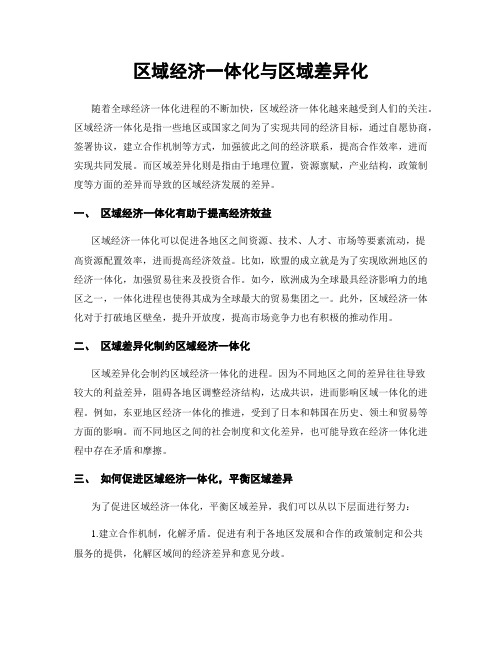
区域经济一体化与区域差异化随着全球经济一体化进程的不断加快,区域经济一体化越来越受到人们的关注。
区域经济一体化是指一些地区或国家之间为了实现共同的经济目标,通过自愿协商,签署协议,建立合作机制等方式,加强彼此之间的经济联系,提高合作效率,进而实现共同发展。
而区域差异化则是指由于地理位置,资源禀赋,产业结构,政策制度等方面的差异而导致的区域经济发展的差异。
一、区域经济一体化有助于提高经济效益区域经济一体化可以促进各地区之间资源、技术、人才、市场等要素流动,提高资源配置效率,进而提高经济效益。
比如,欧盟的成立就是为了实现欧洲地区的经济一体化,加强贸易往来及投资合作。
如今,欧洲成为全球最具经济影响力的地区之一,一体化进程也使得其成为全球最大的贸易集团之一。
此外,区域经济一体化对于打破地区壁垒,提升开放度,提高市场竞争力也有积极的推动作用。
二、区域差异化制约区域经济一体化区域差异化会制约区域经济一体化的进程。
因为不同地区之间的差异往往导致较大的利益差异,阻碍各地区调整经济结构,达成共识,进而影响区域一体化的进程。
例如,东亚地区经济一体化的推进,受到了日本和韩国在历史、领土和贸易等方面的影响。
而不同地区之间的社会制度和文化差异,也可能导致在经济一体化进程中存在矛盾和摩擦。
三、如何促进区域经济一体化,平衡区域差异为了促进区域经济一体化,平衡区域差异,我们可以从以下层面进行努力:1.建立合作机制,化解矛盾。
促进有利于各地区发展和合作的政策制定和公共服务的提供,化解区域间的经济差异和意见分歧。
2. 加强交流,增强互信。
加强在各地区之间的技术、经验、人才等方面的交流,促进互相了解和信任的建立。
3. 统筹规划,优化资源配置。
建立统一的规划和标准化的管理制度,促进资源的优化配置和集约利用,提高利益共享和合作效率。
4. 培育新动能,推动产业升级。
加强新兴产业的发展,推动公共服务的优化和创新,促进体制创新和经济升级。
综上所述,随着全球经济一体化趋势不断加快,推进区域经济一体化已经成为发展的必然趋势。
区域经济一体化概念
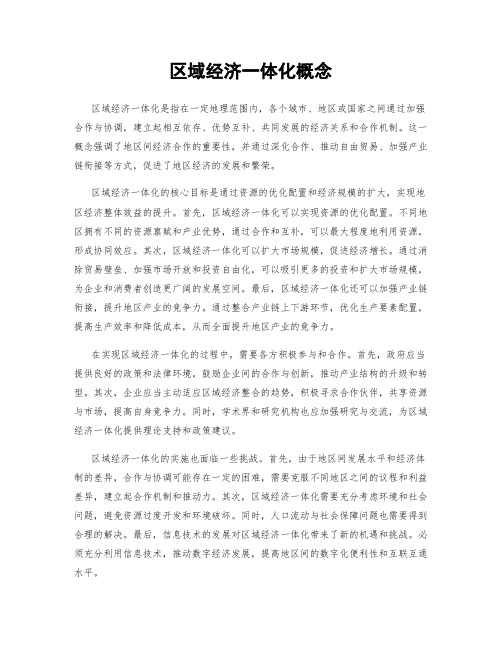
区域经济一体化概念区域经济一体化是指在一定地理范围内,各个城市、地区或国家之间通过加强合作与协调,建立起相互依存、优势互补、共同发展的经济关系和合作机制。
这一概念强调了地区间经济合作的重要性,并通过深化合作、推动自由贸易、加强产业链衔接等方式,促进了地区经济的发展和繁荣。
区域经济一体化的核心目标是通过资源的优化配置和经济规模的扩大,实现地区经济整体效益的提升。
首先,区域经济一体化可以实现资源的优化配置。
不同地区拥有不同的资源禀赋和产业优势,通过合作和互补,可以最大程度地利用资源,形成协同效应。
其次,区域经济一体化可以扩大市场规模,促进经济增长。
通过消除贸易壁垒、加强市场开放和投资自由化,可以吸引更多的投资和扩大市场规模,为企业和消费者创造更广阔的发展空间。
最后,区域经济一体化还可以加强产业链衔接,提升地区产业的竞争力。
通过整合产业链上下游环节,优化生产要素配置,提高生产效率和降低成本,从而全面提升地区产业的竞争力。
在实现区域经济一体化的过程中,需要各方积极参与和合作。
首先,政府应当提供良好的政策和法律环境,鼓励企业间的合作与创新,推动产业结构的升级和转型。
其次,企业应当主动适应区域经济整合的趋势,积极寻求合作伙伴,共享资源与市场,提高自身竞争力。
同时,学术界和研究机构也应加强研究与交流,为区域经济一体化提供理论支持和政策建议。
区域经济一体化的实施也面临一些挑战。
首先,由于地区间发展水平和经济体制的差异,合作与协调可能存在一定的困难,需要克服不同地区之间的议程和利益差异,建立起合作机制和推动力。
其次,区域经济一体化需要充分考虑环境和社会问题,避免资源过度开发和环境破坏。
同时,人口流动与社会保障问题也需要得到合理的解决。
最后,信息技术的发展对区域经济一体化带来了新的机遇和挑战。
必须充分利用信息技术,推动数字经济发展,提高地区间的数字化便利性和互联互通水平。
总的来说,区域经济一体化是一种推动地区经济发展的重要手段和途径。
区域一体化发展对经济增长的作用与影响
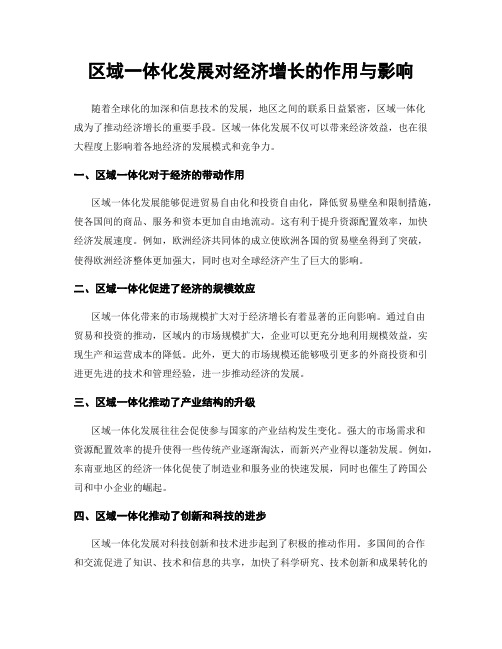
区域一体化发展对经济增长的作用与影响随着全球化的加深和信息技术的发展,地区之间的联系日益紧密,区域一体化成为了推动经济增长的重要手段。
区域一体化发展不仅可以带来经济效益,也在很大程度上影响着各地经济的发展模式和竞争力。
一、区域一体化对于经济的带动作用区域一体化发展能够促进贸易自由化和投资自由化,降低贸易壁垒和限制措施,使各国间的商品、服务和资本更加自由地流动。
这有利于提升资源配置效率,加快经济发展速度。
例如,欧洲经济共同体的成立使欧洲各国的贸易壁垒得到了突破,使得欧洲经济整体更加强大,同时也对全球经济产生了巨大的影响。
二、区域一体化促进了经济的规模效应区域一体化带来的市场规模扩大对于经济增长有着显著的正向影响。
通过自由贸易和投资的推动,区域内的市场规模扩大,企业可以更充分地利用规模效益,实现生产和运营成本的降低。
此外,更大的市场规模还能够吸引更多的外商投资和引进更先进的技术和管理经验,进一步推动经济的发展。
三、区域一体化推动了产业结构的升级区域一体化发展往往会促使参与国家的产业结构发生变化。
强大的市场需求和资源配置效率的提升使得一些传统产业逐渐淘汰,而新兴产业得以蓬勃发展。
例如,东南亚地区的经济一体化促使了制造业和服务业的快速发展,同时也催生了跨国公司和中小企业的崛起。
四、区域一体化推动了创新和科技的进步区域一体化发展对科技创新和技术进步起到了积极的推动作用。
多国间的合作和交流促进了知识、技术和信息的共享,加快了科学研究、技术创新和成果转化的速度。
例如,欧盟的研发合作项目为成员国的科研机构和企业提供了更多的资源和机会,推动了科技的进步和创新能力的提升。
五、区域一体化促进了投资和基础设施建设区域一体化发展通常伴随着国际间的投资和基础设施建设的加强。
通过统筹和整合各国资金和资源,投资能力得到了明显提升,为区域内的经济发展创造了更多的机会和条件。
同时,基础设施的改善和建设也能够有效地促进贸易和经济活动的发展,提高经济增长的潜力。
区域经济一体化对经济增长的影响
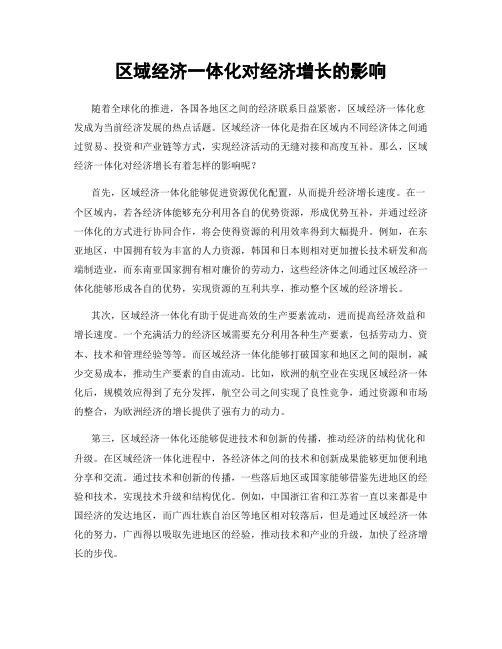
区域经济一体化对经济增长的影响随着全球化的推进,各国各地区之间的经济联系日益紧密,区域经济一体化愈发成为当前经济发展的热点话题。
区域经济一体化是指在区域内不同经济体之间通过贸易、投资和产业链等方式,实现经济活动的无缝对接和高度互补。
那么,区域经济一体化对经济增长有着怎样的影响呢?首先,区域经济一体化能够促进资源优化配置,从而提升经济增长速度。
在一个区域内,若各经济体能够充分利用各自的优势资源,形成优势互补,并通过经济一体化的方式进行协同合作,将会使得资源的利用效率得到大幅提升。
例如,在东亚地区,中国拥有较为丰富的人力资源,韩国和日本则相对更加擅长技术研发和高端制造业,而东南亚国家拥有相对廉价的劳动力,这些经济体之间通过区域经济一体化能够形成各自的优势,实现资源的互利共享,推动整个区域的经济增长。
其次,区域经济一体化有助于促进高效的生产要素流动,进而提高经济效益和增长速度。
一个充满活力的经济区域需要充分利用各种生产要素,包括劳动力、资本、技术和管理经验等等。
而区域经济一体化能够打破国家和地区之间的限制,减少交易成本,推动生产要素的自由流动。
比如,欧洲的航空业在实现区域经济一体化后,规模效应得到了充分发挥,航空公司之间实现了良性竞争,通过资源和市场的整合,为欧洲经济的增长提供了强有力的动力。
第三,区域经济一体化还能够促进技术和创新的传播,推动经济的结构优化和升级。
在区域经济一体化进程中,各经济体之间的技术和创新成果能够更加便利地分享和交流。
通过技术和创新的传播,一些落后地区或国家能够借鉴先进地区的经验和技术,实现技术升级和结构优化。
例如,中国浙江省和江苏省一直以来都是中国经济的发达地区,而广西壮族自治区等地区相对较落后,但是通过区域经济一体化的努力,广西得以吸取先进地区的经验,推动技术和产业的升级,加快了经济增长的步伐。
最后,区域经济一体化还能够促进互联互通和基础设施建设,加速区域内经济发展的全面性和全球竞争力的提升。
区域协同发展的经济影响简介

区域协同发展的经济影响
区域协同发展的经济影响
区域协同发展的经济影响
▪ 区域协同发展的经济影响
1.提高经济效率:区域协同发展可以有效整合资源,提高经济 效率,降低生产成本,提高经济效益。 2.促进产业升级:通过区域协同发展,可以促进产业升级,推 动经济结构优化,提高经济质量。 3.推动区域经济增长:区域协同发展可以促进区域经济增长, 提高区域经济竞争力,推动区域经济发展。 4.促进区域协调发展:区域协同发展可以促进区域协调发展, 缩小区域发展差距,提高区域发展水平。 5.提升区域品牌形象:区域协同发展可以提升区域品牌形象, 提高区域知名度,吸引更多的投资和人才。 6.推动区域创新:区域协同发展可以推动区域创新,提高区域 创新能力,推动区域经济持续发展。
▪ 金融支持
1.金融支持:通过金融支持,可以提供资金保障,推动区域间的经济合作与交流。 2.金融创新:通过金融创新,可以提供更多的金融产品和服务,满足区域间的经济 需求,推动区域间的经济发展。 3.风险管理:通过风险管理,可以降低金融风险,保障金融稳定,推动区域间的经 济发展。
区域协同发展的政策支持
▪ 基础设施建设
1.基础设施建设:通过基础设施建设,可以改善区域间的交通、通信等条件,促进 区域间的经济交流与合作。 2.资源共享:通过基础设施的共享,可以实现资源的优化配置,提高资源的利用效 率,推动区域间的经济发展。 3.环境保护:通过基础设施的建设,可以改善区域间的环境条件,保护生态环境, 推动区域间的可持续发展。
区域协同发展的概念与背景
▪ 区域协同发展的挑战与对策
1.区域协同发展面临的主要挑战包括区域间的经济差距、资源 分配不均、政策协调难度大等问题。 2.区域协同发展需要采取的对策包括加强区域间的合作和交流 、优化区域资源配置、建立有效的协调机制等。 3.区域协同发展需要政府、企业和公众的共同参与和努力,需 要持续推动区域协同发展理论和实践的研究和创新。
区域经济一体化对区域发展的促进作用
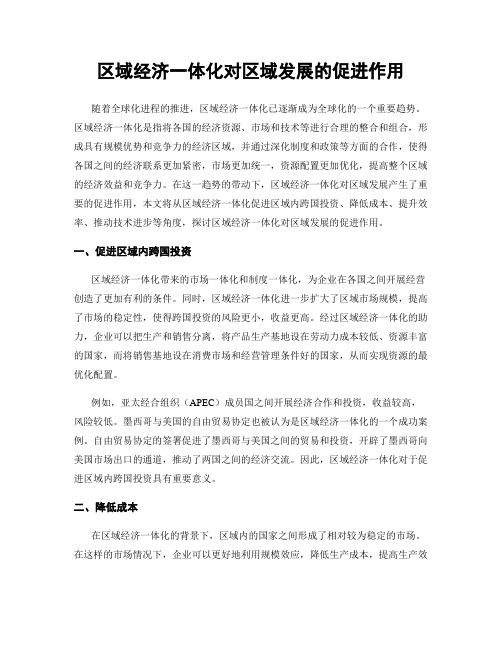
区域经济一体化对区域发展的促进作用随着全球化进程的推进,区域经济一体化已逐渐成为全球化的一个重要趋势。
区域经济一体化是指将各国的经济资源、市场和技术等进行合理的整合和组合,形成具有规模优势和竞争力的经济区域,并通过深化制度和政策等方面的合作,使得各国之间的经济联系更加紧密,市场更加统一,资源配置更加优化,提高整个区域的经济效益和竞争力。
在这一趋势的带动下,区域经济一体化对区域发展产生了重要的促进作用,本文将从区域经济一体化促进区域内跨国投资、降低成本、提升效率、推动技术进步等角度,探讨区域经济一体化对区域发展的促进作用。
一、促进区域内跨国投资区域经济一体化带来的市场一体化和制度一体化,为企业在各国之间开展经营创造了更加有利的条件。
同时,区域经济一体化进一步扩大了区域市场规模,提高了市场的稳定性,使得跨国投资的风险更小,收益更高。
经过区域经济一体化的助力,企业可以把生产和销售分离,将产品生产基地设在劳动力成本较低、资源丰富的国家,而将销售基地设在消费市场和经营管理条件好的国家,从而实现资源的最优化配置。
例如,亚太经合组织(APEC)成员国之间开展经济合作和投资,收益较高,风险较低。
墨西哥与美国的自由贸易协定也被认为是区域经济一体化的一个成功案例。
自由贸易协定的签署促进了墨西哥与美国之间的贸易和投资,开辟了墨西哥向美国市场出口的通道,推动了两国之间的经济交流。
因此,区域经济一体化对于促进区域内跨国投资具有重要意义。
二、降低成本在区域经济一体化的背景下,区域内的国家之间形成了相对较为稳定的市场。
在这样的市场情况下,企业可以更好地利用规模效应,降低生产成本,提高生产效率。
此外,在区域经济一体化的推动下,企业还可以更好地利用各国的优势资源,降低生产成本。
例如,欧盟的成立就带来了很大的经济利益,由于欧盟成员国内部市场稳定,成员国之间的经济关系相对稳定,区域内的企业可以更好地利用规模效应,降低生产成本,提高生产效率,使得区域内的经济体系更加完整、更加稳定。
区域经济一体化对市场发展的影响
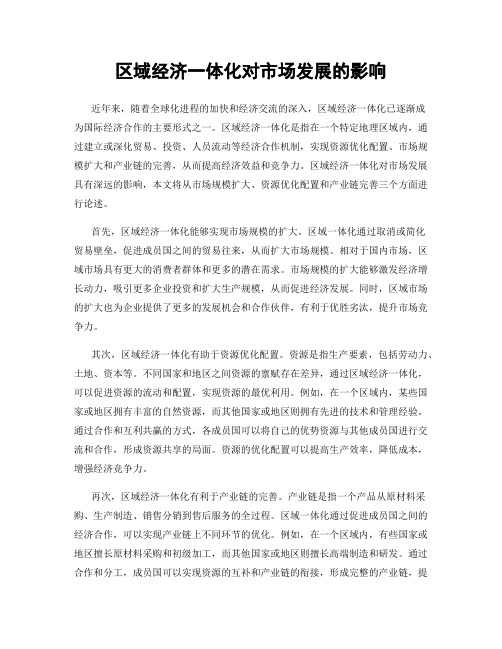
区域经济一体化对市场发展的影响近年来,随着全球化进程的加快和经济交流的深入,区域经济一体化已逐渐成为国际经济合作的主要形式之一。
区域经济一体化是指在一个特定地理区域内,通过建立或深化贸易、投资、人员流动等经济合作机制,实现资源优化配置、市场规模扩大和产业链的完善,从而提高经济效益和竞争力。
区域经济一体化对市场发展具有深远的影响,本文将从市场规模扩大、资源优化配置和产业链完善三个方面进行论述。
首先,区域经济一体化能够实现市场规模的扩大。
区域一体化通过取消或简化贸易壁垒,促进成员国之间的贸易往来,从而扩大市场规模。
相对于国内市场,区域市场具有更大的消费者群体和更多的潜在需求。
市场规模的扩大能够激发经济增长动力,吸引更多企业投资和扩大生产规模,从而促进经济发展。
同时,区域市场的扩大也为企业提供了更多的发展机会和合作伙伴,有利于优胜劣汰,提升市场竞争力。
其次,区域经济一体化有助于资源优化配置。
资源是指生产要素,包括劳动力、土地、资本等。
不同国家和地区之间资源的禀赋存在差异,通过区域经济一体化,可以促进资源的流动和配置,实现资源的最优利用。
例如,在一个区域内,某些国家或地区拥有丰富的自然资源,而其他国家或地区则拥有先进的技术和管理经验。
通过合作和互利共赢的方式,各成员国可以将自己的优势资源与其他成员国进行交流和合作,形成资源共享的局面。
资源的优化配置可以提高生产效率,降低成本,增强经济竞争力。
再次,区域经济一体化有利于产业链的完善。
产业链是指一个产品从原材料采购、生产制造、销售分销到售后服务的全过程。
区域一体化通过促进成员国之间的经济合作,可以实现产业链上不同环节的优化。
例如,在一个区域内,有些国家或地区擅长原材料采购和初级加工,而其他国家或地区则擅长高端制造和研发。
通过合作和分工,成员国可以实现资源的互补和产业链的衔接,形成完整的产业链,提高产品的附加值和市场竞争力。
产业链的完善可以推动经济结构的升级和产业的协同发展。
地区经济一体化对区域发展的影响

地区经济一体化对区域发展的影响随着全球化的不断推进,地区经济一体化成为了促进经济发展的重要手段和路径。
地区经济一体化指的是在地理上相邻的区域内,通过建立统一的市场、开展贸易合作以及加强经济联系,实现经济资源的共享与互补,进而推动整个地区的经济发展。
本文将阐述地区经济一体化对区域发展的影响。
首先,地区经济一体化有助于优化资源配置,促进经济的协同发展。
地区经济一体化意味着地域间资源的整合和优化分配,各地区可以充分发挥自身的优势,优化资源配置,提高生产效率。
不同地区之间的合作和交流将促使经济要素的流动,推动技术创新和产业升级,提高综合竞争力。
例如,华南地区与港澳地区的经济一体化,使得华南地区能够借助港澳的国际金融和物流中心优势,吸引更多外资和技术,推动了地区产业的发展和升级。
其次,地区经济一体化有利于扩大市场规模,提升地区经济的竞争力。
当不同地区的经济相互融合和协同发展时,地区市场规模将得到快速扩大,为企业提供更广阔的销售市场。
这将促使企业增加投资和创新,提高产品和服务质量,增强企业的竞争力。
另外,地区市场的扩大还有助于提升地区的综合竞争力,吸引更多的外商投资和人才流入。
例如,中欧班列的开通和中国与欧洲的铁路运输网络的建设,为中国的内陆地区提供了更便捷的物流通道,有利于提升中部地区的经济竞争力和地区发展水平。
此外,地区经济一体化还有助于实现资源的共享与互补,推动区域产业链的完善和发展。
不同地区拥有不同的资源和产业优势,通过经济一体化合作,可以实现资源的互补和共享,形成更完善的产业链条。
例如,中国华北平原地区的农产品与沿海地区的加工业相结合,形成了完整的农产品产业链。
通过优化资源配置和分工合作,不仅提高了资源利用效率,也提升了地区经济整体的竞争力和综合效益。
此外,地区经济一体化还能够促进人才流动和技术创新,推动区域的科技进步和发展。
地区经济一体化意味着区域之间的经济交流和资源流动,这将为人才的流动和跨区域的科技创新提供更广阔的舞台。
区域经济一体化效应

40%
丙国
20元 在甲国的价格为20元或40元
在乙国的价格为28元
关税同盟建立后:
甲国 35元
贸易
乙国 26元
40%
丙国 20元 在同盟内的价格为28元
贸易创造和贸易转移:英国案例 1973年是英国的生活水平发生变化的一年。农产品的价 格急剧上涨,家庭在一日三餐上的花费增加。价格的上升 并非偶然,而是由于政府的一项决策。英国不再从它原来 的殖民地——澳大利亚购买廉价的农产品,相反却增加了 自己的农业产出,并向价格更昂贵的欧洲邻居购买农产品。 英国为什么做出这样的决策?收益能够抵消损失吗? 英国与澳大利亚的贸易关系是由大英帝国沿袭下来的。澳 大利亚作为英国的殖民地一直向它的宗主国供应食品。销 往英国的产品占1950年澳大利亚出口总量的1/3。但在 1973年,这种贸易传统被打破了。英国与它的邻邦签署 了一项加入欧盟(前身是欧共体)的协议。虽然英国国内普 遍认为此举是正确的,但却不得不接受随之而来的经济后 果
关税同盟建立后:
甲国 35元
贸易
100%
丙国 20元 在甲、乙两国的
价格为40元
乙国 26元
贸易转向是指由于关税同盟对外设置 统一的关税壁垒,是一些成员国的消费者 不得以低价购买非同盟国生产的更低廉的 商品,只能转向同盟内的高价产品并由此 产生经济损失
关税同盟前:
甲国 35元
乙国 26元
免税或20% 贸易
英国消费者为这一变化付出了高昂的代价。加入欧盟之前, 由
于澳大利亚的牛肉、小麦和其他农产晶的生产效率很高,价格也 相当便宜,因此英国是整个欧洲食品支出最低的国家。而加入欧 盟之后,由欧洲进口的农产品价格昂贵,英国不仅食品价格平均 上涨了25%;总通货膨胀率也上升了3%—4%。简单地说,因为 英国的农产品贸易从低成本生产国转移到高成本生产国,购买农 产品不得不花费更多的支出,因而承受了损失。
区域协同发展的经济效益和社会效益评价
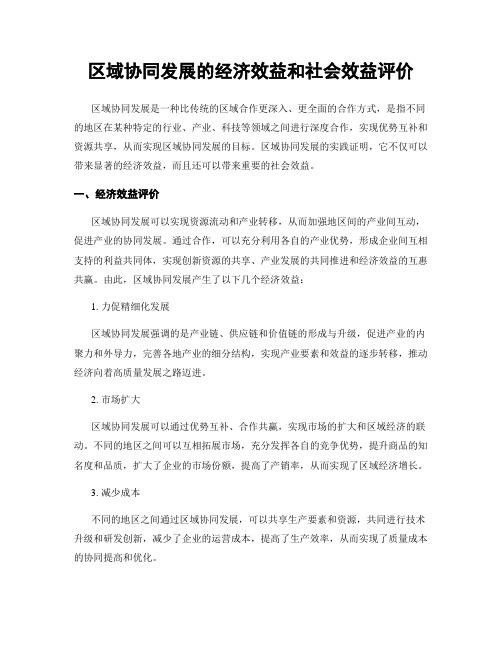
区域协同发展的经济效益和社会效益评价区域协同发展是一种比传统的区域合作更深入、更全面的合作方式,是指不同的地区在某种特定的行业、产业、科技等领域之间进行深度合作,实现优势互补和资源共享,从而实现区域协同发展的目标。
区域协同发展的实践证明,它不仅可以带来显著的经济效益,而且还可以带来重要的社会效益。
一、经济效益评价区域协同发展可以实现资源流动和产业转移,从而加强地区间的产业间互动,促进产业的协同发展。
通过合作,可以充分利用各自的产业优势,形成企业间互相支持的利益共同体,实现创新资源的共享、产业发展的共同推进和经济效益的互惠共赢。
由此,区域协同发展产生了以下几个经济效益:1. 力促精细化发展区域协同发展强调的是产业链、供应链和价值链的形成与升级,促进产业的内聚力和外导力,完善各地产业的细分结构,实现产业要素和效益的逐步转移,推动经济向着高质量发展之路迈进。
2. 市场扩大区域协同发展可以通过优势互补、合作共赢,实现市场的扩大和区域经济的联动。
不同的地区之间可以互相拓展市场,充分发挥各自的竞争优势,提升商品的知名度和品质,扩大了企业的市场份额,提高了产销率,从而实现了区域经济增长。
3. 减少成本不同的地区之间通过区域协同发展,可以共享生产要素和资源,共同进行技术升级和研发创新,减少了企业的运营成本,提高了生产效率,从而实现了质量成本的协同提高和优化。
4. 优化资源配置区域协同发展可以强调产业链、供应链的端到端优化,实现各地资源的合理调配和最优配置,可以克服地域的限制,拓展生产资料和生产要素的来源,实现资源利用效率的最大化和产业效益的最佳化。
二、社会效益评价除了经济效益外,区域协同发展还具有重要的社会效益。
在合作的过程中,通过知识、技术和文化的交流,可以促进地区之间的文化、教育和人才的交流,推动区域社会体系的建设和文化交融,实现以下几个社会效益:1. 提高社会创新能力区域协同发展可以促进创新资源的共享,推动技术创新和知识创新的协同发展,提高社会的创新能力。
略论区域经济一体化带来的经济效应
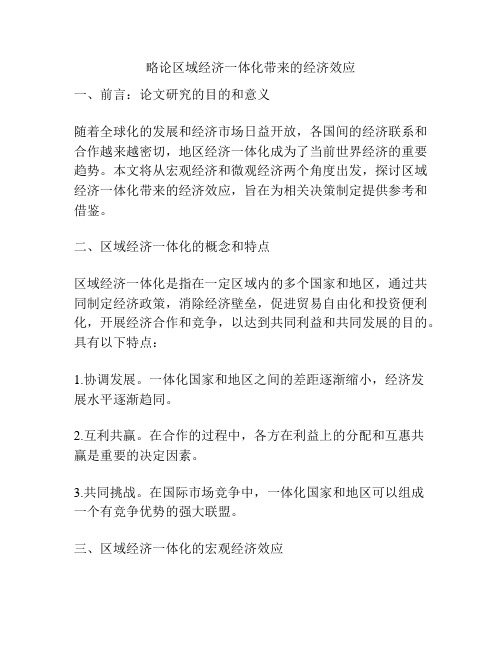
略论区域经济一体化带来的经济效应一、前言:论文研究的目的和意义随着全球化的发展和经济市场日益开放,各国间的经济联系和合作越来越密切,地区经济一体化成为了当前世界经济的重要趋势。
本文将从宏观经济和微观经济两个角度出发,探讨区域经济一体化带来的经济效应,旨在为相关决策制定提供参考和借鉴。
二、区域经济一体化的概念和特点区域经济一体化是指在一定区域内的多个国家和地区,通过共同制定经济政策,消除经济壁垒,促进贸易自由化和投资便利化,开展经济合作和竞争,以达到共同利益和共同发展的目的。
具有以下特点:1.协调发展。
一体化国家和地区之间的差距逐渐缩小,经济发展水平逐渐趋同。
2.互利共赢。
在合作的过程中,各方在利益上的分配和互惠共赢是重要的决定因素。
3.共同挑战。
在国际市场竞争中,一体化国家和地区可以组成一个有竞争优势的强大联盟。
三、区域经济一体化的宏观经济效应1.促进经济增长。
在区域经济一体化的过程中,经济合作和竞争的推进能够促进各个国家和地区的经济增长,进而推动整个区域的增长。
2.进一步开放市场。
区域经济一体化能够促进市场开放程度的提高,降低贸易壁垒,因此跨境商品和服务流通更便捷,价格更透明,市场效率更高。
3.优化资源配置。
通过跨境投资和劳动力流动,区域经济一体化能够优化各个国家和地区的资源配置,提高资源的使用效率和经济效益。
4.增强稳定性。
区域经济一体化在促进整个区域的经济发展的同时,也能增强整个区域的稳定性,减少经济风险和政治风险。
5.推动经济深度融合。
区域经济一体化能够推动各国和地区之间经济深度融合,进一步促进全球经济的整体发展。
四、区域经济一体化的微观经济效应1.促进企业创新。
区域经济一体化能够促进企业之间的合作创新,提高企业的创新能力和竞争力。
2.提高产业协同效应。
区域经济一体化能够形成区域性的产业集群,提高产业内的投入产出效率和协同效应。
3.扩大市场规模。
区域经济一体化能够扩大市场规模,使得企业的销售和利润更稳定,并且提高了企业的生产效率。
地区经济一体化的利弊分析

地区经济一体化的利弊分析随着全球化的加速和经济全球化的发展,地区经济一体化日益成为一个热门的话题。
在过去的二十年里,地区经济一体化已经成为全球经济发展的重要趋势之一,尤其是在亚太地区,逐渐形成了比较完善的地区经济一体化体系。
这种趋势不但会对地区经济产生深远的影响,还会对全球经济产生重要的影响。
因此,本文将从经济角度分析地区经济一体化的利弊。
一、地区经济一体化的利益1.促进贸易自由化与经济安全地区经济一体化的一个最主要的好处就是促进贸易自由化。
随着贸易障碍的逐渐降低、物流和信息技术的不断发展,地区内企业、产品和服务之间在市场上的流动性更强,相互间的比较优势得到了更好的发挥。
进而促进了地区之间贸易的繁荣,提高了整个地区的经济效益。
另外,地区经济一体化还有助于增强经济安全。
在这个多极化的世界里,地区经济一体化有助于地区内经济体的规模扩大,从而减少对外的经济风险和波动的影响。
2.提高投资效率地区经济一体化同时也有助于提高投资效率。
在一个经济一体化的地区,企业可以在各国之间更加便捷地进行技术创新,产业间的相互依赖性和协同性得到充分发挥。
这有利于加速技术、资本和劳动之间的自由流动,促进企业的竞争和创新,提高整个地区的经济效益。
并且,地区经济一体化还有利于增强国际贸易的稳定性。
在地区经济一体化的基础上,各个国家的举措、政策、税制等都会趋于一致。
这有利于减少一些非贸易因素对贸易的干扰,降低贸易摩擦和不确定性,从而提高投资效率。
3.有利于提高资源的利用效率地区经济一体化也有助于提高资源的利用效率。
在一个较小的经济区域内,资源的利用和流动更加自由化和高效,加强了企业间的资源整合、共享与科技创新,同时也提高了资源的利用效率。
地区经济一体化还可以促进能源互通,发挥规模化效应,提高经济的能源利用效率。
二、地区经济一体化的弊端1.地区经济一体化可能导致失业问题地区经济一体化会改变组织结构、产业布局和就业设施。
在一个经济一体化的地区,一些高成本、低劳动生产力的产业可能被淘汰,进而产生一定的失业问题。
区域经济一体化对成员国经济的影响
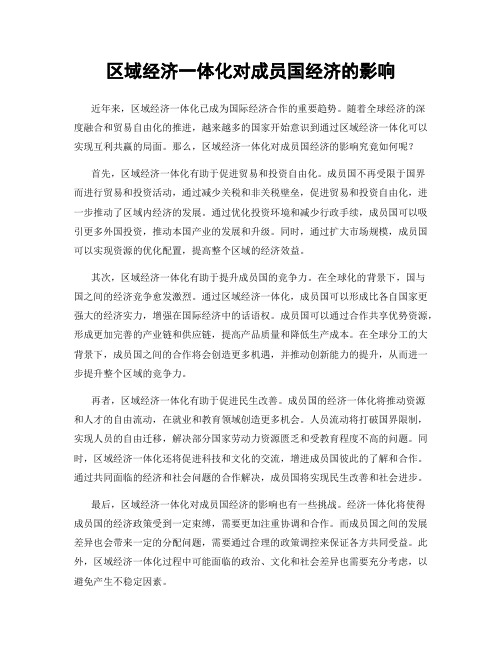
区域经济一体化对成员国经济的影响近年来,区域经济一体化已成为国际经济合作的重要趋势。
随着全球经济的深度融合和贸易自由化的推进,越来越多的国家开始意识到通过区域经济一体化可以实现互利共赢的局面。
那么,区域经济一体化对成员国经济的影响究竟如何呢?首先,区域经济一体化有助于促进贸易和投资自由化。
成员国不再受限于国界而进行贸易和投资活动,通过减少关税和非关税壁垒,促进贸易和投资自由化,进一步推动了区域内经济的发展。
通过优化投资环境和减少行政手续,成员国可以吸引更多外国投资,推动本国产业的发展和升级。
同时,通过扩大市场规模,成员国可以实现资源的优化配置,提高整个区域的经济效益。
其次,区域经济一体化有助于提升成员国的竞争力。
在全球化的背景下,国与国之间的经济竞争愈发激烈。
通过区域经济一体化,成员国可以形成比各自国家更强大的经济实力,增强在国际经济中的话语权。
成员国可以通过合作共享优势资源,形成更加完善的产业链和供应链,提高产品质量和降低生产成本。
在全球分工的大背景下,成员国之间的合作将会创造更多机遇,并推动创新能力的提升,从而进一步提升整个区域的竞争力。
再者,区域经济一体化有助于促进民生改善。
成员国的经济一体化将推动资源和人才的自由流动,在就业和教育领域创造更多机会。
人员流动将打破国界限制,实现人员的自由迁移,解决部分国家劳动力资源匮乏和受教育程度不高的问题。
同时,区域经济一体化还将促进科技和文化的交流,增进成员国彼此的了解和合作。
通过共同面临的经济和社会问题的合作解决,成员国将实现民生改善和社会进步。
最后,区域经济一体化对成员国经济的影响也有一些挑战。
经济一体化将使得成员国的经济政策受到一定束缚,需要更加注重协调和合作。
而成员国之间的发展差异也会带来一定的分配问题,需要通过合理的政策调控来保证各方共同受益。
此外,区域经济一体化过程中可能面临的政治、文化和社会差异也需要充分考虑,以避免产生不稳定因素。
综上所述,区域经济一体化对成员国经济产生了深远的影响。
区域经济一体化对经济增长的促进
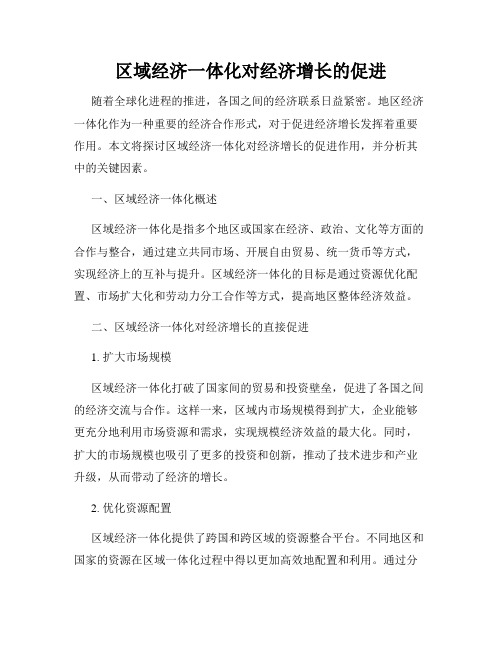
区域经济一体化对经济增长的促进随着全球化进程的推进,各国之间的经济联系日益紧密。
地区经济一体化作为一种重要的经济合作形式,对于促进经济增长发挥着重要作用。
本文将探讨区域经济一体化对经济增长的促进作用,并分析其中的关键因素。
一、区域经济一体化概述区域经济一体化是指多个地区或国家在经济、政治、文化等方面的合作与整合,通过建立共同市场、开展自由贸易、统一货币等方式,实现经济上的互补与提升。
区域经济一体化的目标是通过资源优化配置、市场扩大化和劳动力分工合作等方式,提高地区整体经济效益。
二、区域经济一体化对经济增长的直接促进1. 扩大市场规模区域经济一体化打破了国家间的贸易和投资壁垒,促进了各国之间的经济交流与合作。
这样一来,区域内市场规模得到扩大,企业能够更充分地利用市场资源和需求,实现规模经济效益的最大化。
同时,扩大的市场规模也吸引了更多的投资和创新,推动了技术进步和产业升级,从而带动了经济的增长。
2. 优化资源配置区域经济一体化提供了跨国和跨区域的资源整合平台。
不同地区和国家的资源在区域一体化过程中得以更加高效地配置和利用。
通过分工合作,实现资源的互补性和互补性,实现资源的最优配置。
例如,某一地区拥有丰富的自然资源,而另一地区拥有先进的生产技术,两者结合起来可以实现资源的最大化利用和经济效益的最大化。
3. 促进资金流动区域经济一体化促进了跨境资金流动和投融资活动。
一方面,区域内的金融市场的开放与互联互通降低了跨境融资的成本和障碍,吸引了更多的国内外资本流入。
另一方面,区域内的金融合作和互信也为企业和机构提供了更多的融资渠道和便利,促进了投资和创业的活动,推动了经济的增长。
三、区域经济一体化对经济增长的间接促进1. 技术创新与知识转移区域经济一体化提供了更加广阔的创新平台,使得各国之间的技术创新和知识转移更加便利。
通过区域内的科技合作、研发投入和人才流动,推动了技术创新的进程。
技术创新的推动不仅提高了产业和企业的竞争力,也催生了新兴产业和市场,为经济增长注入新的动力。
区域经济一体化

区域经济一体化区域经济一体化,是指一个地区内的不同经济活动进行整合,以实现资源的优化配置和经济效益的最大化。
在全球化的背景下,区域经济一体化已成为许多国家和地区发展的趋势,它在促进贸易、吸引投资、推动技术创新等方面发挥着重要作用。
本文将从多个角度论述区域经济一体化的意义、挑战和发展方式。
一、区域经济一体化的意义1.1 促进贸易自由化区域经济一体化有助于打破贸易壁垒,推动贸易自由化。
通过建立共同市场、降低关税、减少非关税壁垒等措施,加强区域内国家间的贸易合作,提高贸易效率,为各国带来更多机会和发展空间。
1.2 优化资源配置区域经济一体化可以实现资源的优化配置。
通过共享资源和合作开发,可以充分利用各地的特色产业和资源优势,提高资源利用效率,推动区域性经济发展,促进产业升级和创新。
1.3 提升竞争力区域经济一体化有助于提升区域的整体竞争力。
通过加强合作和协调,可以形成区域间的良性竞争格局,吸引更多投资、人才和技术创新,提高区域的经济实力和市场竞争力。
二、区域经济一体化面临的挑战2.1 经济发展不平衡地区之间的经济发展水平差异较大,区域经济一体化面临着经济发展不平衡的挑战。
不同地区之间的产业结构、技术水平和人力资源配置存在差异,整合的过程中需要解决各方利益的问题,确保整体利益最大化。
2.2 政策协调难度区域经济一体化需要各地区之间的政策协调和制度衔接。
不同地区的政策环境、税收政策、法律法规等存在差异,需要通过制度创新和政策协商来解决,确保整合的顺利进行。
2.3 文化差异和社会问题区域经济一体化面临着文化差异和社会问题的挑战。
不同地区之间存在着语言、风俗、价值观等方面的差异,需要通过相互理解和融合来缓解文化冲突和社会矛盾,确保区域一体化的可持续发展。
三、区域经济一体化的发展方式3.1 多边合作多边合作是区域经济一体化的重要方式之一。
通过建立多边机制、签署多边协议和推动多边合作项目,促进各方利益的平衡和共赢,实现区域性经济一体化的目标。
区域一体化对经济发展的影响和政策建议
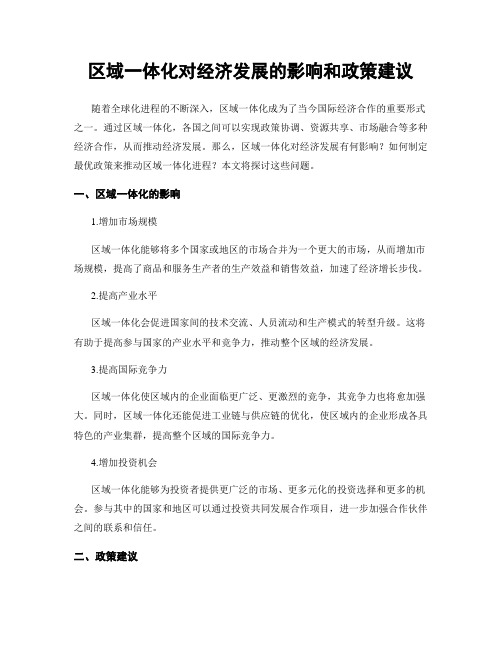
区域一体化对经济发展的影响和政策建议随着全球化进程的不断深入,区域一体化成为了当今国际经济合作的重要形式之一。
通过区域一体化,各国之间可以实现政策协调、资源共享、市场融合等多种经济合作,从而推动经济发展。
那么,区域一体化对经济发展有何影响?如何制定最优政策来推动区域一体化进程?本文将探讨这些问题。
一、区域一体化的影响1.增加市场规模区域一体化能够将多个国家或地区的市场合并为一个更大的市场,从而增加市场规模,提高了商品和服务生产者的生产效益和销售效益,加速了经济增长步伐。
2.提高产业水平区域一体化会促进国家间的技术交流、人员流动和生产模式的转型升级。
这将有助于提高参与国家的产业水平和竞争力,推动整个区域的经济发展。
3.提高国际竞争力区域一体化使区域内的企业面临更广泛、更激烈的竞争,其竞争力也将愈加强大。
同时,区域一体化还能促进工业链与供应链的优化,使区域内的企业形成各具特色的产业集群,提高整个区域的国际竞争力。
4.增加投资机会区域一体化能够为投资者提供更广泛的市场、更多元化的投资选择和更多的机会。
参与其中的国家和地区可以通过投资共同发展合作项目,进一步加强合作伙伴之间的联系和信任。
二、政策建议1.加强政策的协调和整合区域一体化需要各参与国家的政策协调和整合。
政策上的矛盾将会影响区域内各个经济体之间的利益平衡,阻碍区域经济一体化进程。
因此,需要加强政策的协调和整合,以促进区域一体化的顺利实施。
2.加强人才培养和流动人才是经济发展的重要基础。
区域一体化的实现需要大量技术和管理人才,而这些人才通常需要经过培养和流动才能满足需求。
因此,各参与国家应采取措施加强人才培养和流动,以实现人才的共享。
3.加强基础设施建设基础设施建设是区域一体化的关键。
在区域一体化的过程中可能需要建设大量的基础设施,如交通、能源等设施。
各参与国家应加强基础设施建设,以促进整个区域的发展。
4.强化知识产权保护知识产权保护是推动经济创新和高质量发展的关键。
区域经济一体化的经济效益评估
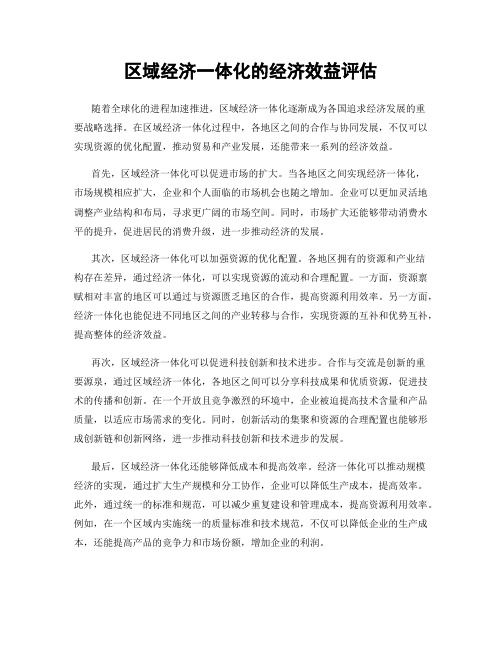
区域经济一体化的经济效益评估随着全球化的进程加速推进,区域经济一体化逐渐成为各国追求经济发展的重要战略选择。
在区域经济一体化过程中,各地区之间的合作与协同发展,不仅可以实现资源的优化配置,推动贸易和产业发展,还能带来一系列的经济效益。
首先,区域经济一体化可以促进市场的扩大。
当各地区之间实现经济一体化,市场规模相应扩大,企业和个人面临的市场机会也随之增加。
企业可以更加灵活地调整产业结构和布局,寻求更广阔的市场空间。
同时,市场扩大还能够带动消费水平的提升,促进居民的消费升级,进一步推动经济的发展。
其次,区域经济一体化可以加强资源的优化配置。
各地区拥有的资源和产业结构存在差异,通过经济一体化,可以实现资源的流动和合理配置。
一方面,资源禀赋相对丰富的地区可以通过与资源匮乏地区的合作,提高资源利用效率。
另一方面,经济一体化也能促进不同地区之间的产业转移与合作,实现资源的互补和优势互补,提高整体的经济效益。
再次,区域经济一体化可以促进科技创新和技术进步。
合作与交流是创新的重要源泉,通过区域经济一体化,各地区之间可以分享科技成果和优质资源,促进技术的传播和创新。
在一个开放且竞争激烈的环境中,企业被迫提高技术含量和产品质量,以适应市场需求的变化。
同时,创新活动的集聚和资源的合理配置也能够形成创新链和创新网络,进一步推动科技创新和技术进步的发展。
最后,区域经济一体化还能够降低成本和提高效率。
经济一体化可以推动规模经济的实现,通过扩大生产规模和分工协作,企业可以降低生产成本,提高效率。
此外,通过统一的标准和规范,可以减少重复建设和管理成本,提高资源利用效率。
例如,在一个区域内实施统一的质量标准和技术规范,不仅可以降低企业的生产成本,还能提高产品的竞争力和市场份额,增加企业的利润。
综上所述,区域经济一体化带来的经济效益不容忽视。
通过市场扩大、资源优化配置、科技创新和效率提升等方面的作用,区域经济一体化能够推动经济的快速发展和稳定增长。
区域经济一体化的影响及挑战
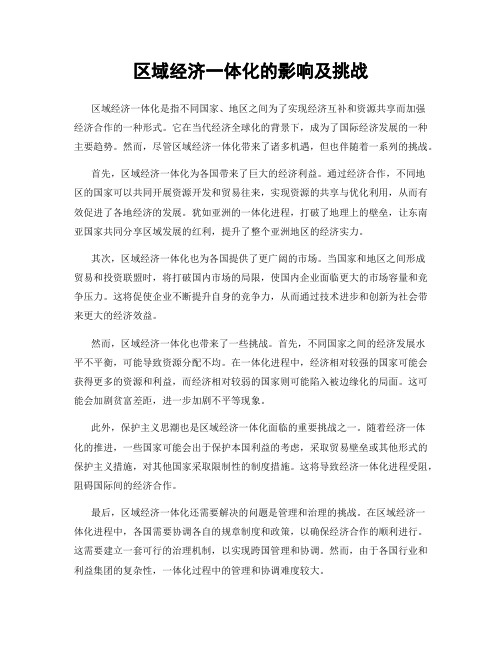
区域经济一体化的影响及挑战区域经济一体化是指不同国家、地区之间为了实现经济互补和资源共享而加强经济合作的一种形式。
它在当代经济全球化的背景下,成为了国际经济发展的一种主要趋势。
然而,尽管区域经济一体化带来了诸多机遇,但也伴随着一系列的挑战。
首先,区域经济一体化为各国带来了巨大的经济利益。
通过经济合作,不同地区的国家可以共同开展资源开发和贸易往来,实现资源的共享与优化利用,从而有效促进了各地经济的发展。
犹如亚洲的一体化进程,打破了地理上的壁垒,让东南亚国家共同分享区域发展的红利,提升了整个亚洲地区的经济实力。
其次,区域经济一体化也为各国提供了更广阔的市场。
当国家和地区之间形成贸易和投资联盟时,将打破国内市场的局限,使国内企业面临更大的市场容量和竞争压力。
这将促使企业不断提升自身的竞争力,从而通过技术进步和创新为社会带来更大的经济效益。
然而,区域经济一体化也带来了一些挑战。
首先,不同国家之间的经济发展水平不平衡,可能导致资源分配不均。
在一体化进程中,经济相对较强的国家可能会获得更多的资源和利益,而经济相对较弱的国家则可能陷入被边缘化的局面。
这可能会加剧贫富差距,进一步加剧不平等现象。
此外,保护主义思潮也是区域经济一体化面临的重要挑战之一。
随着经济一体化的推进,一些国家可能会出于保护本国利益的考虑,采取贸易壁垒或其他形式的保护主义措施,对其他国家采取限制性的制度措施。
这将导致经济一体化进程受阻,阻碍国际间的经济合作。
最后,区域经济一体化还需要解决的问题是管理和治理的挑战。
在区域经济一体化进程中,各国需要协调各自的规章制度和政策,以确保经济合作的顺利进行。
这需要建立一套可行的治理机制,以实现跨国管理和协调。
然而,由于各国行业和利益集团的复杂性,一体化过程中的管理和协调难度较大。
综上所述,区域经济一体化对经济发展带来了重要的影响。
它提供了巨大的机遇和利益,但也面临诸多挑战和困难。
为了实现经济一体化的长期可持续发展,各国应加强合作,加强规划和管理,以应对挑战,最大限度地实现经济合作的互利共赢。
区域经济一体化效益
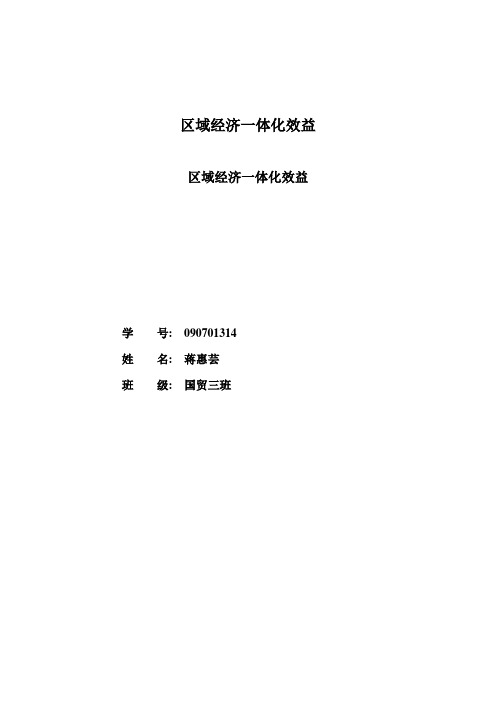
区域经济一体化效益区域经济一体化效益学号: 090701314姓名: 蒋惠芸班级: 国贸三班Regional economic integration benefits allBY Alexander Wan and Jian Er (China Daily) Updated:2005-03-30 11:14China's rapid economic development is going to deliver real benefits rather than pose threats to its Asian neighbours, including ASEAN countries and Japan.This point was forcefully made by Long Yongtu, secretary-general of the Boao Forum for Asia, at the ninth China Daily CEO Roundtable themed "China-Asia Business Partnership: Implications for multinationals" held in Beijing yesterday.At the conference organized by China Daily, Long pointed out that economic integration in Asia is of strategical importance for all countries in the region as well as those companies including multinationals operating in this region.This point was also echoed by some 30 China-based chief executive officers and senior executives of leading multinationals, domestic companies and international organizations such as BASF, Shell, Pfizer Investment, BMW Group, British Airways, the Walt Disney Company, Eastman Kodak, China Unicom and Clear Media, as well as the Asian Development Bank, who attended the conference yesterday.Focus on regional co-operationChina has become a very active participant in regional economic co-operation and integration in recent years. The objective of the initiatives is to let other Asian countries share the economic achievements that China has made in the past decades, said Long.The country has demonstrated its strong willingness and commitment to regional integration such as establishing a free trade area with ASEAN (Association of Southeast Asian Nations) countries and proposing such an area with Japan and South Korea in recent years."The key words during the process are open and responsible," stressed Long.The former chief negotiator for China's resumption of GATT contracting party status and its accession to the World Trade Organization (WTO), Long said China's WTO membership and its continuing spectacular economic growth had prompted the country to switch from an conservative to an active approach to achieve economic integration in Asia."China considered that its active participation in regional integration could be interpreted by the international community that China intends to become open and responsible. That's why China started its long journey of negotiation on the establishment of a free trade area with ASEAN countries," said Long, who is now active in promoting regional economic co-operation.Meanwhile, China also intended to deliver a strategically important message that it wished to alleviate concerns among its neighbours, including ASEAN countries.The concerns, resulting from the rapid economic development of China, included issues like China taking away their foreign investment and jobs and the rise of China posing a threat to regional stability.It was reported that beginning this July, China and the ASEAN countries will implement an agreement on the trade of goods under their FTA pacts.Tariffs on most goods flowing within the China-ASEAN FTA will be finally cutto zero by 2010.Figures from the Ministry of Commerce of China show that trade in goods covered by an "early harvest programme" - the prelude to an FTA - between China and ASEAN members, reached US$1.7 billion by the end of last year, up 41 per cent year-on-year. The "early harvest programme" exempts some products from tariffs before the FTA is completed."So regional economic integration is a kind of sharing that China wants to show its responsibility to create common prosperity and development in Asia," said Long.East Asia linking upLong, a veteran in multilateral economic, trade and legal affairs, continued that China, Japan and South Korea, whose combined GDP accounted for about 90 per cent of the total in East Asia, could play a more important role in this process.Analysts expected China to lead a feasibility study for an East Asian FTA this year.The East Asian FTA, bringing together China, Japan, South Korea and ASEAN member states, should be an exciting goal for China and the entire region, although achieving this will not be a simple task. China and South Korea started a non-governmental FTA study two weeks ago."Without close economic co-operation among China, Japan and South Korea, it could not be meaningful for East Asia economic integration," he emphasized.Specifically, China and Japan could make joint efforts in many fields, such as energy, to work towards regional co-operation.Long indicated that some misconceptions currently exist about Sino-Japanese relations. For example, as many media have reported, China is furiously competing with Japan as both are now the world's major oil importers, both with massive demand for oil."I do not agree with that point of view," Long stressed. "I am very optimistic about the overall relationship, especially the trade relationship, because I now see that China and Japan share much more in common than ever before."Taking the energy sector as an example, Long said China and Japan shared a lot in common, given that both are concerned "about the production, exploitation, price stability, and the safe transportation of oil.""Despite some current political difficulties, I firmly believe that China and Japan will become very close economic partners in the long term, because of the demand of market forces and the demand of economic integration in the region," Long said."We should seek the common grounds of the two countries and explore all possibilities to seek multilateral prosperity and stability in the region," he stressed. "China and Japan are mutually needed."Long also added that the integration between East Asia and South Asia is of equal importance in the region, and ASEAN countries could act as a bridge between the two.It was reported that a FTA feasibility study with Pakistan is likely to be completed during the upcoming visit of Premier Wen Jiabao to Pakistan in April.Along with the completion of the joint feasibility study, formal FTA negotiationsare expected to commence during Wen's visit.Reports said Pakistan and China have agreed on a summary regarding the FTA, which comprises items that would get duty facilitation ahead of the FTA and would be signed in April during Wen's visit.Executives' viewSharing the efforts to promote regional integration, Toru Shibuchi, China country director of the Asian Development Bank (ADB), said the ADB has been devoted to promote regional integration in Asia through some trade-facilitation measures. He revealed that about 20 agreements to simplify customs clearance would be signed by six Mekong countries including Thailand, Cambodia and Viet Nam.Henry Wang, corporate planning director of Shell China, said he totally agreed with the importance of regional co-operation. Giving the chemical industry as an example, Wang said the promotion of the use of clean energy such as natural gas and LNG (liquefied natural gas) in Asian countries, including China, would help achieve win-win integration and benefit the countries and the companies involved."When it comes to regional integration, China could be a major pool of talent in Asia," said Allan Gabor, chairman and general manager of Pfizer Investment. Out of the 1,200 staff in its research and development division, only four are non-Chinese.Gabor's view was echoed by Peter Bowie, chief executive officer of Deloitte China, the strategic partner of the CEO roundtable. The company is planning to invest US$150 million in China in the next few years, 60 per cent of which will be invested in people.Meanwhile, Bowie said China should focus more on establishing a sound financial system and free flow of services in the country to help propel the process of regional integration.Speaking of a country's responsibility during regional integration, William Valentino, general manager of corporate communications for Bayer Far East (Greater China), said government leaders should pay more attention to healthcare and environmental issues.For instance, the bird flu outbreak in Viet Nam has affected the whole region, while pollution in China might affect its neighbours."Trade might have barriers among countries while the environment and healthcare are typical issues with no boundary restrictions," he said.Echoing Long's view on China and Japan's energy co-operation, Tadashi Ishihara, CEO and director of the board of Nissan (China) Investment Co Ltd, suggested that China and Japan could work together on advanced research and development projects like energy-saving technology.Furthermore, William Lo, executive director and vice-president of China Unicom Ltd, said he was familiar with integration as it happened a lot in the telecom industry, and he had a distinctive view on the issue. "Integration is a matter of time. It does not come from the government's initiatives but from the contribution of the private sector," said Lo.Ying Yeh, chairman of Eastman Kodak Greater China Region, pointed out that governments in Asia should consider more for the multinational companies whenformulating regional trade and economic policies."The business sector should be the primary force of the process of regional integration, and integration would turn into empty talk, without a contribution from the private sector," Long said."Multinationals should play an active role here by providing information and incentives, as well as policy advice to governments," Long concluded.区域经济一体化效益亚历山大年夜湾和剑呃(中国日报)更新时刻:2005-03-30十一14中国经济的快速成长将供给实事实上在的好处,而不是威逼到亚洲邻国,包含东盟国度和日本。
区域一体化发展的重要意义
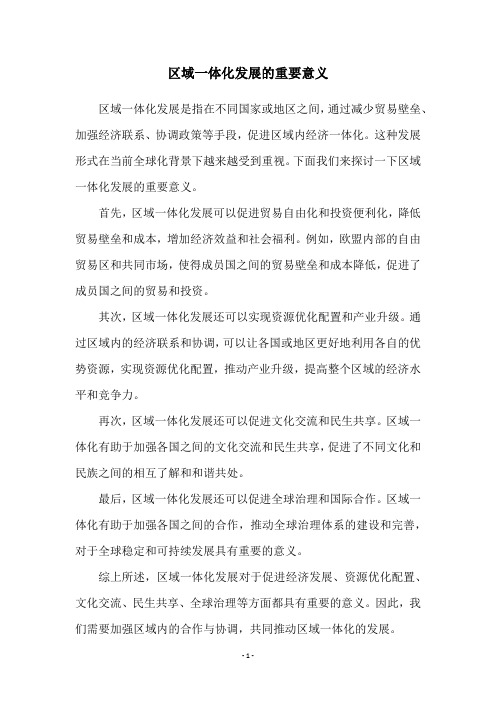
区域一体化发展的重要意义
区域一体化发展是指在不同国家或地区之间,通过减少贸易壁垒、加强经济联系、协调政策等手段,促进区域内经济一体化。
这种发展形式在当前全球化背景下越来越受到重视。
下面我们来探讨一下区域一体化发展的重要意义。
首先,区域一体化发展可以促进贸易自由化和投资便利化,降低贸易壁垒和成本,增加经济效益和社会福利。
例如,欧盟内部的自由贸易区和共同市场,使得成员国之间的贸易壁垒和成本降低,促进了成员国之间的贸易和投资。
其次,区域一体化发展还可以实现资源优化配置和产业升级。
通过区域内的经济联系和协调,可以让各国或地区更好地利用各自的优势资源,实现资源优化配置,推动产业升级,提高整个区域的经济水平和竞争力。
再次,区域一体化发展还可以促进文化交流和民生共享。
区域一体化有助于加强各国之间的文化交流和民生共享,促进了不同文化和民族之间的相互了解和和谐共处。
最后,区域一体化发展还可以促进全球治理和国际合作。
区域一体化有助于加强各国之间的合作,推动全球治理体系的建设和完善,对于全球稳定和可持续发展具有重要的意义。
综上所述,区域一体化发展对于促进经济发展、资源优化配置、文化交流、民生共享、全球治理等方面都具有重要的意义。
因此,我们需要加强区域内的合作与协调,共同推动区域一体化的发展。
- 1、下载文档前请自行甄别文档内容的完整性,平台不提供额外的编辑、内容补充、找答案等附加服务。
- 2、"仅部分预览"的文档,不可在线预览部分如存在完整性等问题,可反馈申请退款(可完整预览的文档不适用该条件!)。
- 3、如文档侵犯您的权益,请联系客服反馈,我们会尽快为您处理(人工客服工作时间:9:00-18:30)。
区域经济一体化效益区域经济一体化效益学号: 090701314姓名: 蒋惠芸班级: 国贸三班Regional economic integration benefits allBY Alexander Wan and Jian Er (China Daily) Updated:2005-03-30 11:14China's rapid economic development is going to deliver real benefits rather than pose threats to its Asian neighbours, including ASEAN countries and Japan.This point was forcefully made by Long Yongtu, secretary-general of the Boao Forum for Asia, at the ninth China Daily CEO Roundtable themed "China-Asia Business Partnership: Implications for multinationals" held in Beijing yesterday.At the conference organized by China Daily, Long pointed out that economic integration in Asia is of strategical importance for all countries in the region as well as those companies including multinationals operating in this region.This point was also echoed by some 30 China-based chief executive officers and senior executives of leading multinationals, domestic companies and international organizations such as BASF, Shell, Pfizer Investment, BMW Group, British Airways, the Walt Disney Company, Eastman Kodak, China Unicom and Clear Media, as well as the Asian Development Bank, who attended the conference yesterday.Focus on regional co-operationChina has become a very active participant in regional economic co-operation and integration in recent years. The objective of the initiatives is to let other Asian countries share the economic achievements that China has made in the past decades, said Long.The country has demonstrated its strong willingness and commitment to regional integration such as establishing a free trade area with ASEAN (Association of Southeast Asian Nations) countries and proposing such an area with Japan and South Korea in recent years."The key words during the process are open and responsible," stressed Long.The former chief negotiator for China's resumption of GATT contracting party status and its accession to the World Trade Organization (WTO), Long said China's WTO membership and its continuing spectacular economic growth had prompted the country to switch from an conservative to an active approach to achieve economic integration in Asia."China considered that its active participation in regional integration could be interpreted by the international community that China intends to become open and responsible. That's why China started its long journey of negotiation on the establishment of a free trade area with ASEAN countries," said Long, who is now active in promoting regional economic co-operation.Meanwhile, China also intended to deliver a strategically important message that it wished to alleviate concerns among its neighbours, including ASEAN countries.The concerns, resulting from the rapid economic development of China, included issues like China taking away their foreign investment and jobs and the rise of China posing a threat to regional stability.It was reported that beginning this July, China and the ASEAN countries will implement an agreement on the trade of goods under their FTA pacts.Tariffs on most goods flowing within the China-ASEAN FTA will be finally cutto zero by 2010.Figures from the Ministry of Commerce of China show that trade in goods covered by an "early harvest programme" - the prelude to an FTA - between China and ASEAN members, reached US$1.7 billion by the end of last year, up 41 per cent year-on-year. The "early harvest programme" exempts some products from tariffs before the FTA is completed."So regional economic integration is a kind of sharing that China wants to show its responsibility to create common prosperity and development in Asia," said Long.East Asia linking upLong, a veteran in multilateral economic, trade and legal affairs, continued that China, Japan and South Korea, whose combined GDP accounted for about 90 per cent of the total in East Asia, could play a more important role in this process.Analysts expected China to lead a feasibility study for an East Asian FTA this year.The East Asian FTA, bringing together China, Japan, South Korea and ASEAN member states, should be an exciting goal for China and the entire region, although achieving this will not be a simple task. China and South Korea started a non-governmental FTA study two weeks ago."Without close economic co-operation among China, Japan and South Korea, it could not be meaningful for East Asia economic integration," he emphasized.Specifically, China and Japan could make joint efforts in many fields, such as energy, to work towards regional co-operation.Long indicated that some misconceptions currently exist about Sino-Japanese relations. For example, as many media have reported, China is furiously competing with Japan as both are now the world's major oil importers, both with massive demand for oil."I do not agree with that point of view," Long stressed. "I am very optimistic about the overall relationship, especially the trade relationship, because I now see that China and Japan share much more in common than ever before."Taking the energy sector as an example, Long said China and Japan shared a lot in common, given that both are concerned "about the production, exploitation, price stability, and the safe transportation of oil.""Despite some current political difficulties, I firmly believe that China and Japan will become very close economic partners in the long term, because of the demand of market forces and the demand of economic integration in the region," Long said."We should seek the common grounds of the two countries and explore all possibilities to seek multilateral prosperity and stability in the region," he stressed. "China and Japan are mutually needed."Long also added that the integration between East Asia and South Asia is of equal importance in the region, and ASEAN countries could act as a bridge between the two.It was reported that a FTA feasibility study with Pakistan is likely to be completed during the upcoming visit of Premier Wen Jiabao to Pakistan in April.Along with the completion of the joint feasibility study, formal FTA negotiationsare expected to commence during Wen's visit.Reports said Pakistan and China have agreed on a summary regarding the FTA, which comprises items that would get duty facilitation ahead of the FTA and would be signed in April during Wen's visit.Executives' viewSharing the efforts to promote regional integration, Toru Shibuchi, China country director of the Asian Development Bank (ADB), said the ADB has been devoted to promote regional integration in Asia through some trade-facilitation measures. He revealed that about 20 agreements to simplify customs clearance would be signed by six Mekong countries including Thailand, Cambodia and Viet Nam.Henry Wang, corporate planning director of Shell China, said he totally agreed with the importance of regional co-operation. Giving the chemical industry as an example, Wang said the promotion of the use of clean energy such as natural gas and LNG (liquefied natural gas) in Asian countries, including China, would help achieve win-win integration and benefit the countries and the companies involved."When it comes to regional integration, China could be a major pool of talent in Asia," said Allan Gabor, chairman and general manager of Pfizer Investment. Out of the 1,200 staff in its research and development division, only four are non-Chinese.Gabor's view was echoed by Peter Bowie, chief executive officer of Deloitte China, the strategic partner of the CEO roundtable. The company is planning to invest US$150 million in China in the next few years, 60 per cent of which will be invested in people.Meanwhile, Bowie said China should focus more on establishing a sound financial system and free flow of services in the country to help propel the process of regional integration.Speaking of a country's responsibility during regional integration, William Valentino, general manager of corporate communications for Bayer Far East (Greater China), said government leaders should pay more attention to healthcare and environmental issues.For instance, the bird flu outbreak in Viet Nam has affected the whole region, while pollution in China might affect its neighbours."Trade might have barriers among countries while the environment and healthcare are typical issues with no boundary restrictions," he said.Echoing Long's view on China and Japan's energy co-operation, Tadashi Ishihara, CEO and director of the board of Nissan (China) Investment Co Ltd, suggested that China and Japan could work together on advanced research and development projects like energy-saving technology.Ying Yeh, chairman of Eastman Kodak Greater China Region, pointed out that governments in Asia should consider more for the multinational companies when formulating regional trade and economic policies."The business sector should be the primary force of the process of regional integration, and integration would turn into empty talk, without a contribution from the private sector," Long said."Multinationals should play an active role here by providing information andincentives, as well as policy advice to governments," Long concluded.区域经济一体化效益亚历山大湾和剑呃(中国日报)更新时间:2005-03-30十一14中国经济的快速发展将提供实实在在的利益,而不是威胁到亚洲邻国,包括东盟国家和日本。
